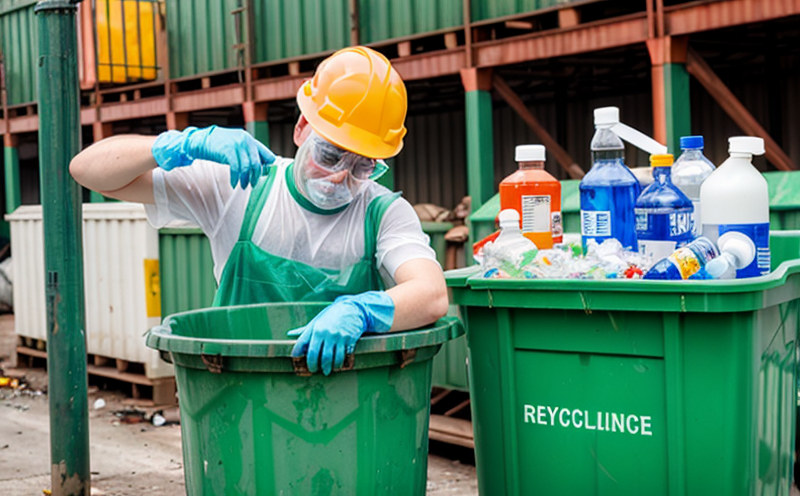EN 15002 Waste and Recycled Soil Sample Preparation Testing
The EN 15002 standard provides a robust framework for the preparation of soil samples intended for chemical testing within waste management and recycling sectors. This service is essential for ensuring that soil samples are processed correctly, thereby providing accurate and reliable data for compliance with regulatory requirements.
The process begins by collecting the original sample in accordance with the specified guidelines provided by EN 15002. The collected material must be representative of the waste or recycled soil being tested. Once obtained, the sample is subjected to a series of preparatory steps which include:
- Sorting and sieving: Removing any non-soil materials.
- Mixing thoroughly to ensure uniformity.
- Drying at controlled temperatures (typically 105°C ±2°C) to remove excess moisture without altering the chemical composition.
- Weighing the dried sample accurately according to standard protocols.
These steps are critical for ensuring that subsequent analytical results reflect true properties of the waste or recycled soil under test. Failure at any stage can lead to inaccurate data, which may impact compliance decisions and ultimately affect environmental outcomes.
The service we offer includes not only sample preparation but also detailed documentation of each step taken during this process. This transparency ensures traceability throughout the testing lifecycle and supports robust quality assurance practices.
Our team uses state-of-the-art equipment such as gravimetric balances, drying ovens, sieves, and other specialized tools designed to meet the stringent requirements outlined in EN 15002. By adhering strictly to these standards, we guarantee consistent and accurate results that are both reproducible and comparable across different laboratories.
Understanding the importance of accurate sample preparation has never been more crucial given increasing scrutiny from regulatory bodies worldwide who seek reliable evidence supporting their decisions regarding waste management practices. Our commitment to precision ensures you receive trustworthy data upon which sound judgments can be made about your operations' compliance status.
Scope and Methodology
| Step | Description |
|---|---|
| Sample Collection | The initial step involves collecting the sample from the specified location. This must be done in accordance with EN 15002 guidelines to ensure representativeness. |
| Sorting and Sieving | Non-soil materials are removed, followed by sieving to achieve a uniform particle size distribution. |
| Mixing Thoroughly | The sample is mixed uniformly before further processing. |
| Drying at Controlled Temperatures | Excess moisture is removed from the soil, maintaining its chemical composition integrity. |
| Weighing Accurately | The dried sample weight is recorded precisely using gravimetric balances. |
The detailed table above outlines the key steps involved in our EN 15002 compliant soil sample preparation process. Each step contributes to achieving high-quality samples that yield accurate test results, ensuring reliability and consistency throughout your project lifecycle.
International Acceptance and Recognition
The EN 15002 standard has gained widespread recognition across Europe and beyond due to its emphasis on accuracy, repeatability, and reproducibility. Many countries have adopted this standard as part of their national regulations concerning waste management and recycling operations.
Our laboratory adheres strictly to these internationally recognized standards, ensuring that all services provided align with global best practices. This commitment not only enhances our reputation but also helps clients achieve smoother compliance processes by producing results widely accepted in international markets.
Competitive Advantage and Market Impact
Beyond mere compliance, adopting EN 15002 compliant practices offers several strategic benefits:
- Enhanced Reputation: By demonstrating adherence to recognized international standards, companies can build trust with stakeholders.
- Informed Decision Making: Accurate and reliable data contribute significantly towards informed decision-making processes related to waste management strategies.
- Compliance Simplification: With clear procedures defined in EN 15002, organizations find it easier to navigate complex regulatory landscapes.
- Increased Efficiency: Properly prepared samples reduce the likelihood of retesting or sample rejection, leading to more efficient workflows overall.
In today’s competitive market, where sustainability and environmental responsibility are increasingly important factors, implementing these standards can give your organization a significant edge. It demonstrates leadership in responsible waste management practices while fostering long-term relationships with clients who value such commitments.





